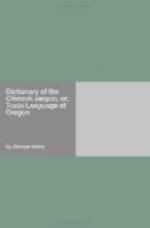Mel-a-kwa, or Mal-a-kwa, n. French, MARANGOUIN. (Anderson.) A mosquito.
Mel’-ass, n. French, MELASSE. Molasses.
Mem’-a-loost, v., n., part. Chinook, MEMALUST. To die; dead. Mamook memaloost, to kill.
Me-sah-chie, adj. Chinook, MASACHI. Bad; wicked.
Me-si’-ka, pron. Chinook, MESAIKA. You; your; yours.
Mi’-ka, pron. Chinook, MAIKA. Thou; thy; thine.
Mi’-mie, adv. Chinook, MAIAMI. Down stream.
Mist-chi’-mas, n. Quaere u. d. A slave. Dr. Scouler gives this word as Nootka and Columbian. Mr. Hale makes it Chinook. It is certainly, however, neither Chinook nor Chihalis; and Jewitt gives kakoelth as Nootka, while I find the Makah word kotlo, and the Nittinat kotl.
Mit-ass, n. Cree, MITAS. (Anderson.) Leggings. A word imported by the Canadian French.
Mit’-lite, v. Chinook, MITLAIT. To sit; sit down; stay at; reside; remain. It is also used in place of to have and to be. Ex. Mitlite kopa house, he is in the house; mitlite hyiu salmon kopa mika? have you plenty of salmon? mitlite (imp.), sit down; cultus mitlite, to stop anywhere without particular object; mitlite tenas, to be with child; mitlite keekwillie, to put down.
Mit’-whit, v. Chinook, AMETWHET. To stand; stand up. Mitwhit stick, a standing tree; a mast.
Mokst, adj. Chinook, MAKST. Two; twice.
Moo’-la, n. French, MOULIN. A mill. Stick moola, a saw-mill.
Moo’-lock, n. Chinook, EMULUK. An elk. This word, strangely enough, occurs also in the Koquilth of Humboldt Bay.
Moon, n. English, idem. The moon. Ikt moon, a month; sick moon, the wane or old moon.
Moos’-moos, n. Klikatat, MUSMUS; Chinook, EMUSMUS. Buffalo; horned cattle. The word, slightly varied, is common to several languages. Mr. Anderson derives it from the Cree word moostoos, a buffalo, and supposes it to have been imported by the Canadians; but Father Pandosy makes musmus Yakama.
Moo’-Sum, v., n. Chihalis, MUSAM. To sleep; sleep. Tikegh moosum, or olo moosum, to be sleepy (literally, to want, or be hungry for sleep); nika hyas moosum, I slept very sound.
Mow-itsh, or Mah’-witsh, n. Nootka, MAUITSH (Hale); Nittinat, MOITSH, a deer; Nootka, MOOWATSH, a bear (Jewitt). A deer; venison. Frequently used to signify a wild animal; as, huloima mowitch, a strange or different kind of beast. The meaning given in Jewitt’s book is probably a misprint. Like moolock, an elk, the word is found in the Koquilth of Humboldt Bay.




